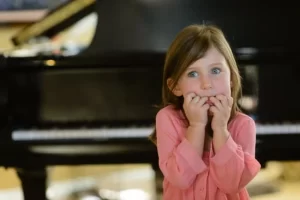Navigating the Holiday Season: A Guide for Your Child with Social Anxiety

 As the holiday season approaches with its twinkling lights and promise of festive gatherings with family and friends, many of us feel excitement and anticipation. However, for your child struggling with social anxiety, the thought of holiday celebrations can also bring about a sense of worry and even dread. The pressure to engage in social interactions, navigate crowded events, and manage heightened expectations can turn what should be a happy time into a source of stress.
As the holiday season approaches with its twinkling lights and promise of festive gatherings with family and friends, many of us feel excitement and anticipation. However, for your child struggling with social anxiety, the thought of holiday celebrations can also bring about a sense of worry and even dread. The pressure to engage in social interactions, navigate crowded events, and manage heightened expectations can turn what should be a happy time into a source of stress.
In this article, I’ll explore the unique challenges kids and teens with social anxiety might face during the holidays and provide practical strategies to help them not only cope but also find moments of genuine enjoyment.
Let’s begin by looking more closely at the nuances of social anxiety and discover empowering ways to make this festive season a more manageable and positive experience for everyone.
What is Social Anxiety?
Social anxiety, also known as Social Anxiety Disorder (SAD) or Social Phobia, is a common mental health condition characterized by an intense fear of social situations and a strong desire to avoid them. This fear is often rooted in concerns about being judged, embarrassed, or negatively evaluated by others. While it can affect people of all ages, social anxiety frequently emerges during childhood or adolescence.
In kids and teens, social anxiety can manifest in various ways, and its presentation may differ based on the individual. Here are some common signs and symptoms of social anxiety in kids and teens:
Excessive fear of judgement
Children and teens with social anxiety often have an overwhelming fear of being judged or negatively evaluated by others. This fear may extend to a wide range of social situations, such as school events, parties, or even everyday interactions.
Avoidance of social situations
A key feature of social anxiety is the avoidance of social situations that trigger anxiety. This can result in a child or teen withdrawing from social activities, avoiding eye contact, or even refusing to attend school or participate in extracurricular activities.
Physical symptoms
Social anxiety can manifest physically, with children and teens experiencing symptoms such as blushing, trembling, sweating, nausea, or a racing heartbeat when faced with social situations.
Difficulty initiating or maintaining conversation
Kids and teens with social anxiety may struggle with starting or sustaining conversations. They may fear saying something embarrassing or worry about being judged for their words or actions.
Negative self-talk
Individuals with social anxiety often engage in negative self-talk, where they criticize themselves or anticipate negative outcomes in social situations. This internal dialogue can contribute to feelings of low self-esteem and heightened anxiety.
Performance anxiety
Social anxiety can extend to situations where an individual is the center of attention, such as giving a presentation or performing in front of others. The fear of being judged negatively in these situations can be particularly distressing.
Difficulty making friends
Social anxiety may impact a child’s ability to form and maintain friendships. The fear of rejection or ridicule can hinder social interactions and the development of meaningful relationships.
Academic impact
Social anxiety can affect school performance. Children and teens may be reluctant to participate in class discussions, give presentations, or collaborate on group projects, leading to academic challenges.
Low self-esteem
Social anxiety is often associated with negative self-perception. Kids and teens may have low self-esteem, feel inadequate, or believe that others see them in a negative light.
Rumination
After social interactions, individuals with social anxiety may engage in rumination, replaying the event in their minds and focusing on perceived mistakes or embarrassing moments.
What are the Most Common Stressors for Your Child with Social Anxiety During the Holidays?
Kids and teens with social anxiety will likely face specific stressors during the holidays that can make their anxiety worse. It’s important to recognize these stressors in order to provide helpful support.
Here are some of the most common holiday stressors:
Increased social interactions
Holiday gatherings often involve more social interactions than usual. For kids and teens with social anxiety, the prospect of meeting and interacting with extended family, friends, and acquaintances can be overwhelming.
Expectations and pressure
The holidays come with societal expectations of joy, togetherness, and celebration. The pressure to appear happy and engage in festivities can be stressful for individuals with social anxiety who fear being judged for not meeting these expectations.
Public performances or presentations
School performances, recitals, or family traditions that involve public speaking or performing can be sources of intense anxiety for kids and teens with social anxiety.
Large gatherings
 Crowded holiday parties or events can be challenging for individuals with social anxiety. The noise, commotion, and the need to navigate through large groups can trigger anxiety.
Crowded holiday parties or events can be challenging for individuals with social anxiety. The noise, commotion, and the need to navigate through large groups can trigger anxiety.
Meeting new people
Holiday events often introduce kids and teens to new faces, including relatives, family friends, or peers. The fear of meeting new people and the uncertainty of how to navigate these interactions can be a significant stressor.
Gift giving and receiving
Gift-giving can be stressful for individuals with social anxiety. They may worry about selecting the right gifts, how their own gifts will be viewed, or the potential for negative reactions.
Family dynamics
Family gatherings can be emotionally charged, and kids or teens with social anxiety may be sensitive to family dynamics. Tensions or conflicts among family members can heighten anxiety.
Judgment and criticism
The fear of judgment or criticism can intensify during the holidays, especially when individuals with social anxiety feel that their actions or behaviors are being closely watched by others.
Pressure to participate in activities
Some holiday traditions involve activities that individuals with social anxiety may find challenging, such as group games, caroling, or other community events that require active participation.
Unpredictable schedule
Changes in routine and an unpredictable holiday schedule can be unsettling for individuals with social anxiety who may find comfort in structure and familiarity.
Fear of embarrassment
Social anxiety often involves a fear of embarrassment or humiliation. This fear may be heightened during holiday events where attention might be drawn to individuals, such as during gift exchanges or more public celebrations.
Social media comparisons
The prevalence of social media during the holidays can contribute to feelings of inadequacy. Kids and teens with social anxiety may compare their holiday experiences to others, amplifying feelings of isolation or perceived inadequacy.
Understanding these stressors can help you provide targeted support for your child with social anxiety during the holiday season.
13 Tips for Helping Your Child with Social Anxiety Navigate the Holidays
What might some of this targeted support look like? Here are some suggestions to help your child not only survive but thrive during holiday gatherings:
suggestions to help your child not only survive but thrive during holiday gatherings:
Prepare in advance
Talk to your child about the upcoming event, providing details about what to expect. Discuss who will be there, the activities planned, and any potential challenges. Knowing what to expect can help alleviate anxiety.
Set realistic expectations
Help your child understand that it’s okay to feel a bit anxious, and they don’t have to be perfect. Encourage realistic expectations and emphasize that the goal is to enjoy the gathering rather than aiming for flawless social interactions.
Create a safe space
Identify a quiet and comfortable space at the event where your child can retreat if they need a break. Having a designated safe space allows them to recharge and regroup if they feel overwhelmed.
Practice social skills
Role-play various social scenarios with your child beforehand. Practice greetings, small talk, and other social interactions to build their confidence and make them feel more prepared.
Establish a signal
Work with your child to establish a discreet signal they can use to let you know when they need a break or are feeling overwhelmed. This can be a simple gesture or phrase that indicates the need for support.
Encourage small interactions
Rather than diving into large group conversations, encourage your child to engage in smaller, more manageable interactions. One-on-one or small group interactions can be less overwhelming and allow for more meaningful connections.
Focus on shared activities
 Participate in activities that provide a natural context for interaction. Whether it’s playing a game, decorating cookies, or engaging in a craft, shared activities can ease the pressure of direct social interaction.
Participate in activities that provide a natural context for interaction. Whether it’s playing a game, decorating cookies, or engaging in a craft, shared activities can ease the pressure of direct social interaction.
Bring a comfort item
Allow your child to bring a comfort item, such as a favorite book or small toy, to provide a sense of familiarity and security in unfamiliar settings.
Practice relaxation techniques
Teach your child relaxation techniques such as deep breathing or mindfulness exercises. These strategies can be helpful in managing anxiety during stressful moments.
Set time limits
Let your child know in advance how long the gathering is expected to last. Knowing that there is a defined endpoint can make the event feel more manageable.
Encourage self-advocacy
Teach your child to express their needs and boundaries. Encourage them to communicate with you or other trusted adults if they are feeling overwhelmed or need assistance.
Celebrate small victories
Acknowledge and celebrate small successes, whether it’s initiating a conversation, joining an activity, or staying at the event for a specific duration. Positive reinforcement can boost confidence.
Offer post-event reflection
After the gathering, discuss the experience with your child. Ask them about what went well and what challenges they faced. Use this reflection as an opportunity to learn and prepare for future events.
Be patient, supportive, and flexible in your approach, and focus on creating an environment that allows your child to feel comfortable and valued during holiday gatherings
It’s important to note that experiencing occasional shyness or nervousness in social situations is normal for many children and teens. However, when these feelings become persistent, overwhelming, and significantly interfere with a child’s daily life, it may indicate the presence of social anxiety.
If you suspect that your child or teen is struggling with social anxiety, seeking the guidance of a mental health professional can be instrumental in providing appropriate support and interventions.
Begin Online Therapy for Kids and Teens with Anxiety in Illinois and now Florida.
If your child or teen is struggling with anxiety, including panic attacks, there is hope! Anxiety is highly treatable and online anxiety treatment at Briefly Counseling can help.
treatable and online anxiety treatment at Briefly Counseling can help.
Using Solution-Focused Brief Therapy, I help kids and teens reduce their anxiety and build resilience so they can become a happier, more confident version of themselves.
And kids love being able to receive counseling from the comfort and privacy of their own home. Studies have consistently proven that online therapy delivers equal results to in-office counseling.
As an experienced and caring therapist, I love providing counseling for anxiety. To start your child’s counseling journey, call me at 224-236-2296 or email Helena@BrieflyCounseling.com to schedule a FREE 20-minute consultation.
Helena Madsen, MA, LCPC is the founder of Briefly Counseling. I specialize in providing online short-term anxiety treatment for kids and teens ages 7 – 18 as well as Christian counseling.
Whether you’re on the North Shore, in Naperville, Chicago, Champaign, Barrington, Libertyville, Glenview, or downstate Illinois, I can help.
And effective 2024, I am now licensed in Florida! For parents in Jacksonville, Pensacola, Destin, Crestview, Coral Gables, Weston, Parkland, Naples, Marco Island, and Pinecrest, I have immediate openings.
Schedule your appointment or consultation today. I look forward to working with your child to quickly and effectively help them in activating their strengths, resources, and resilience, in order to live with confidence and hope.

